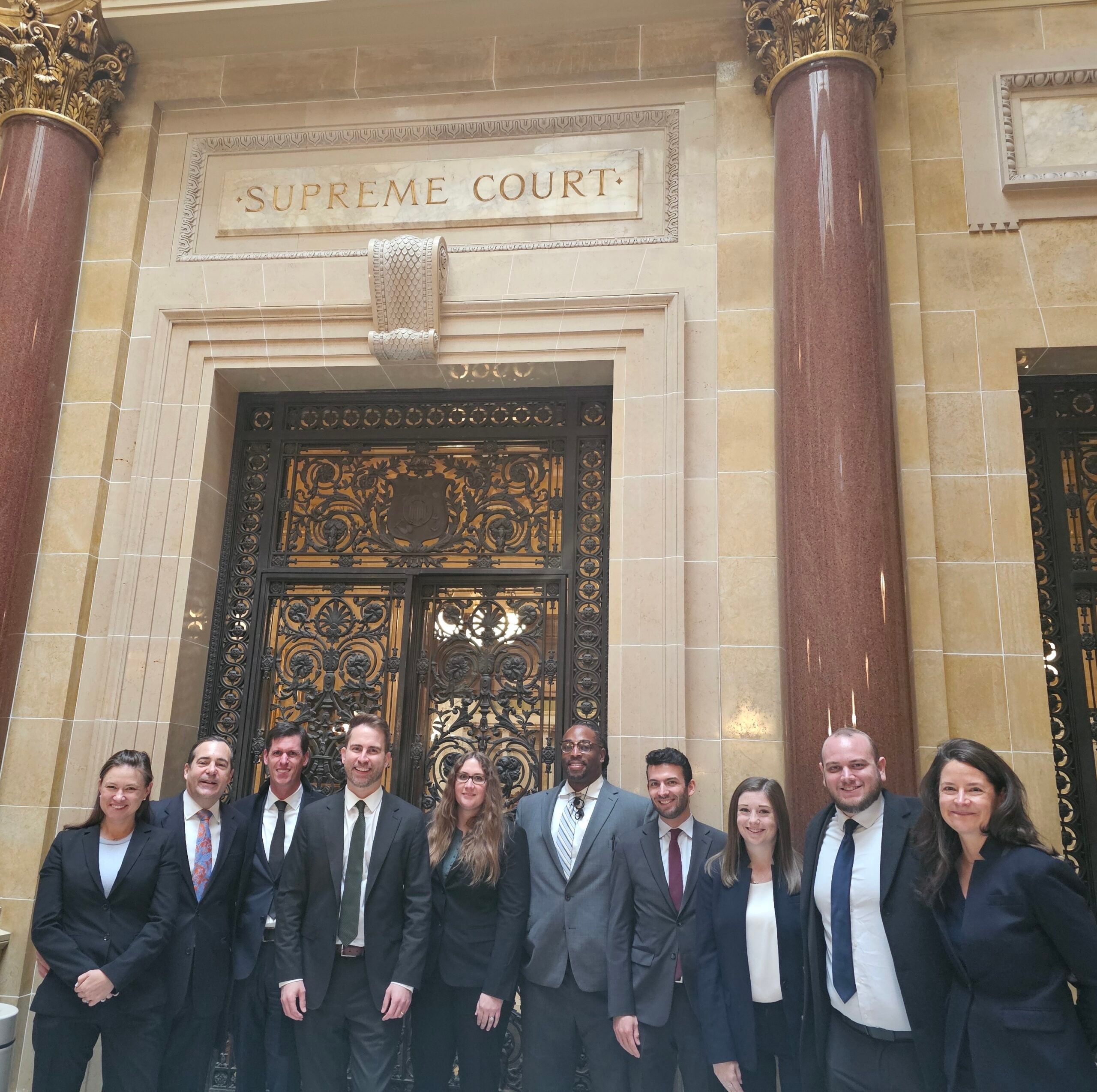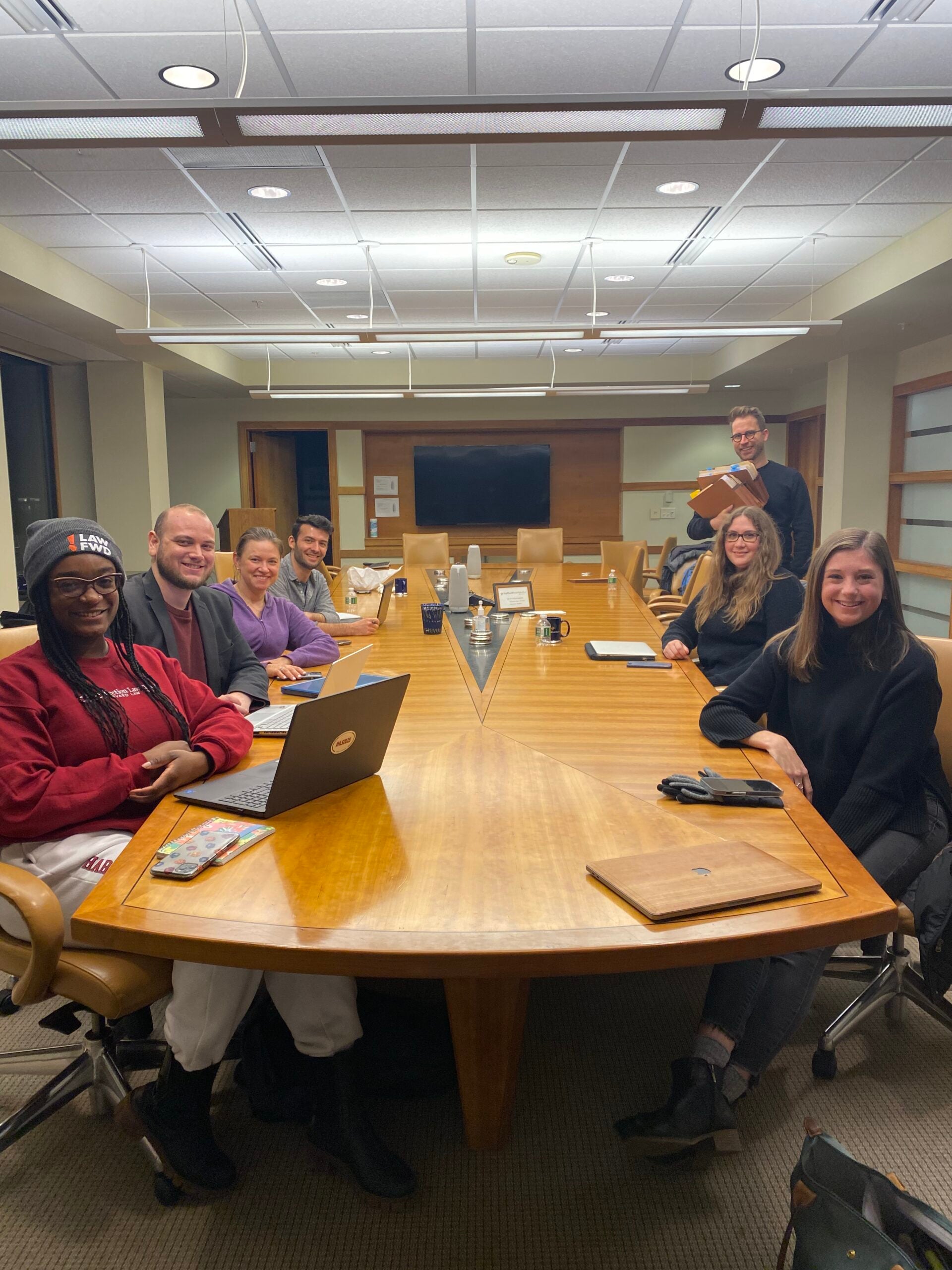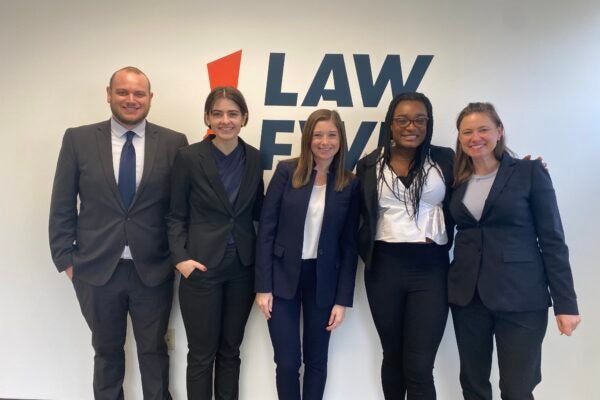In Clarke v. Wisconsin, the Harvard Law Election Law Clinic fought to restore voting power to Wisconsin residents – and won. The state’s highest court agreed with the clinic’s argument: Wisconsin’s gerrymandered state legislative maps were non-contiguous, diluting the voting power of the state’s residents and preventing fair representation.

The case brought the clinic team – including clinic director Ruth Greenwood, program coordinator Veniece Miller, and students Déborah Aléxis ‘25, Justin Walker ‘24, and Marisa Wright ‘24 – to Madison for oral arguments at the Wisconsin Supreme Court in December. The clinic worked in partnership with co-counsels Law Forward, Stafford Rosenbaum, Campaign Legal Center, and Arnold & Porter to represent the local petitioners on the case, which came to a favorable decision just before the holidays.
“It was inspiring to be at the oral argument at the Wisconsin Supreme Court,” says Wright. “We walked into the Capitol building and saw the petitioners talking about how much this means to them. They’d waited so long for this moment and are so involved in the case. It’s such an honor to represent their interests on such an important issue.”
The case
The Wisconsin State Constitution requires contiguous districts, meaning that all parts of the district must be adjacent to or touching each other without any gaps or interruptions, to ensure that voters within a particular district with geographical proximity can share common interests and concerns. The clinic’s lawsuit challenges the maps’ districts as noncontiguous, pointing out not only the literal islands on the Great Lakes that have been isolated, but also the municipal islands created by disconnected districts.
“The state constitution requires contiguity,” Wright explains. “State constitutions are theoretically supposed to reflect the will of the people. It was not being respected.”
The non-contiguous islands impact voters in a few key ways. First, legislators may not be adequately responsive to constituents spread across these disconnected areas. “You’re not going to be visiting them very often. You’re not going to be holding constituent meetings or events for them where they can have their voices heard,” Wright says.
Secondly, the islands break apart communities that share common interests. For example, voters on a lake may care about coastal issues while those in a mainland town 40 miles away may not. “These maps disconnect communities that have similar interests that they want their legislator to respond to,” says Wright. “The maps are grouping people together that shouldn’t necessarily be grouped together.”
In this way, the maps create barriers to organizing communities. Wright recalls meeting with a plaintiff represented in the case named Dee Sweet, a resident of Northern Wisconsin involved in political organizing her Native American tribe. Sweet has found that the maps in question made organizing and engaging voters difficult because they felt like their vote did not matter. According to Sweet, the maps were so skewed and unrepresentative that residents felt alienated from the political process.
After many hours of research and preparation, Wright, Aléxis, Walker, and Greenwood sat in the courtroom alongside local petitioners as lead counsel Mark Gaber of Campaign Legal Center brought these issues to the judges’ attention. In the Court’s majority opinion, Justice Jill Karofsky noted that contiguous districts are not “mere technical requirement, but an important tool” to ensure fair districting practices. Upon the Court’s decision, the maps will be redrawn in time for the 2024 election.
The clinical experience

Students in the Election Law Clinic were active partners in the case, collaborating closely with clinical instructors and co-counsel to provide memos and preparation for oral arguments.
Wright participated in many rounds of moot arguments to help prepare Gaber for oral arguments in the case; students took turns acting as justices while the others prepared potential lines of questioning that could arise. At the oral argument, Wright noted that the moot practice helped prepare the legal team for difficult questions that came up during the real proceedings. “For us [students], that experience was really helpful, because we each got assigned an area of the law to focus on and write questions and develop answers for,” she recalls. “We were able to dive into that issue and practice, what is this like? How should you try to pull a thread with someone, and how much should you argue back or push the advocate?”
“I owe my future career to the Election Law Clinic.”
Marisa Wright ’24
The trip to observe oral arguments and meet the plaintiffs in Wisconsin provided a learning opportunity that couldn’t be had anywhere else.
“Our partners have been so kind and willing to provide feedback and great opportunities for us as students to learn and be part of the case,” Wright says. She also notes the importance of connecting with attorneys on the ground in the region: “It’s been very exciting to work with local counsel based in Wisconsin. They know the lay of the land, especially because we’re in state court. It’s so amazing to learn from them and see people doing really incredible work in this area.”
The Election Law Clinic combines both litigation and advocacy work, which Wright found valuable. “I really liked that balance, because I don’t think I want to litigate forever. Being able to see that whole process, which is not something you really cover in classes, has been such a great opportunity in the election law space,” she remarks.
The hands-on legal work has provided Wright with valuable skills she plans to apply in her future career. After graduation, she will begin a post-graduate fellowship at the Campaign Legal Center focused on state Voting Rights Acts. According to Wright, this opportunity likely would not have been possible without the experience gained through the Election Law Clinic.
“I owe my future career to the Election Law Clinic,” she reflects. “Professor Greenwood has been so generous in connecting [clinical students] to people in the election law and voting rights space. My fellowship project is related to some of the work that we do in the clinic. The clinic has been great about helping us develop the skills that you need to be a voting rights lawyer.”
Filed in: Clinical Spotlight
